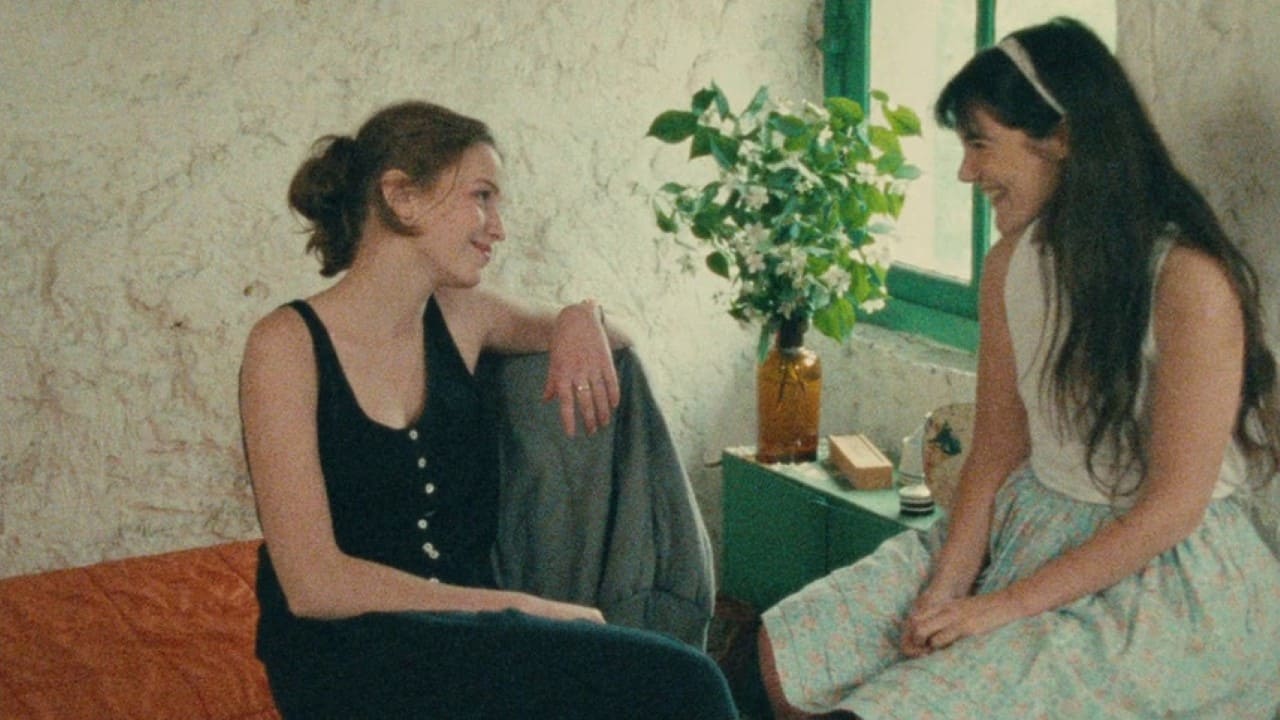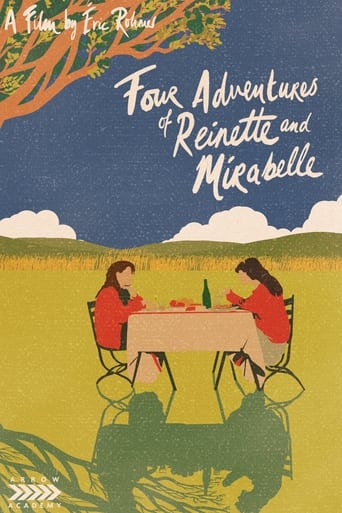

Reinette and Mirabelle are two young women. Reinette lives in the countryside, Mirabelle in Paris. They meet during a holiday of Mirabelle in the country, when Reinette helps her to repair the tube of her bicycle and shows her the beauties of nature and in particular the 'blue hour'.This is the classic meeting of the "city mouse" and the "country mouse". While the country mouse knows such things as how to cook and fix bicycles, she does not concern herself with such high-minded concepts as "ethnology". In her domain, she is the queen.But we also see stories here where it pays to be a smart city mouse... through deception and cunning, you can get what you want in ways the innocent, sincere person never can. The interactions with both the waiter and the art dealer are just so good and really make this film a treasure.
... View MoreI love Eric Rohmer's movies mainly those in which, like in this one, he shows normal daily life that can have important episodes which can be gracious, humorous, even sometimes having poetry or a bit of mystery, unexpectedness and adventure. He shows his characters thinking and philosophizing about apparently simple things and behaviours and those thoughts often contrast with real life events. We can also see through the dialogues the contrast of the universe of values we may have in mind and the real world outside. In this movie two young girls meet by chance when one of them has got a flat tyre while riding a bicycle in the countryside and the other one offers to help her to solve the problem. From now on they become close friends though they are very different in temperament, mentality and behaviour. The one who lives in the country goes to Paris and the other one who lived there already, shares her apartment with her new friend. Both are university students, the Parisian one in Ethnology and the country one in Fine Arts. After the first adventure of her meeting they live in Paris 3 more episodes of daily life which were adventurous but without going much beyond the natural and ordinary and shown with great simplicity but also with great mastery. Only in my opinion the fourth and last episode is a bit too fanciful but the movie is good in its whole despite that.
... View MoreI'm a huge Rohmer fan. I've seen all of the Moral Tales, the Comedies & Proverbs and the Tales of the Four Seasons. I dislike this particular film tremendously. Along with "Rendez-Vous in Paris," it represents Rohmer at his worst... moralistic, pedantic and amateurish. I've seen better summer camp skits than the bit at the cafe, the scene at the train station and the business at the art gallery. Frankly, with the exception of "The Blue Hour", the project is a wash. Joelle Miquel and Philippe Laudenbach deliver terrible, over-the-top performances, and even the great Fabrice Luchini seems foolish and out of place. Jessica Forde is passable as the jaded town rat. The only stand out (at least in a positive sense) is Marie Riviere who, as always, is entirely believable.I'm not sure why this project got such a high IMDb rating. I can only think that people like the two-name films ("Celine and Julie", "Fanny and Alexander", etc.) because they sound whimsically playful. Rohmer has an excellent sense of humor (e.g., Conte d'ete, Boyfrends and Girlfriends, etc.), but this is not a delightful little caprice. With the exception of the first 20 minutes or so, it's a student project. Note also the horrendous original electronic music. Rohmer often refrains entirely from the use of music, and this is one case where he should have shown his usual restraint.
... View MoreI read in a short critique of Rohmer recently the perfect sentence to describe his work and how to approach it: "It is when we let Rohmer's irony (the incongruence of his characters) be a seed of self-reflection within ourselves that his films take on a transcendent dimension." The transcendent dimension that all great works of art have is there but you have to let the irony become a seed of self-reflection first, you have to actively participate, hence the reason why many people find Rohmer's films boring. They don't even realize what they're missing and don't want to know! The closer a Rohmer film is to soap opera on the surface and the less offbeat it is the more money it makes (the recent "Autumn's Tale" made a very impressive 2 million dollars on the art-house circuit but I, for one, thought it was just o.k.), but ALL of them have depth if you look for it.Rohmer's films slowly and quietly build into elaborate structures of subtly hilarious sophistication which get better with each viewing (letting the irony really take root and become a seed of self-reflection). They are all (on the surface at least) very similar: done low-budget but with quietly superb and magnificent cinematography, maximum conversation, minimum hi-jinks or action, relying on subtlety and the viewer's undivided attention and engagement to reveal their deep humor and depth. All of Rohmer's films make fun of human folly and vanity in a way that's entirely unprecedented, true-to-life, and unique in the cinema. Critics have labeled the term 'classicist' on his head but I don't know of any filmmakers or artists, outside of some of the great satirical novelists of the 19th century, who have approached their subject in this way. There is an incredible amount of pure cinema in Rohmer but done in a way that's completely invisible when the viewer's not seeking it out, absolutely devoid of any tendencies to show-off and draw attention to itself. "Four Adventures of Reinette and Mirabelle" is about two young girls, one a surrealistic-painter from the country, the other-- a law-student from Paris , both very pretty and charming, who strike up a friendship and go through a few neurotic and enlightening incidents together both in the city and the country: trying to wake up at the moment of absolute silence every morning when night-birds stop chirping and morning birds are still asleep; dealing with a rude Paris cafe waiter; dealing with pan-handlers trying to hustle them for change; moral dilemmas about shoplifting; selling Reinette's painting without her having to speak one word to the gallery owner because she's sticking to a vow of silence she made the day before; etc. The Very Funny and valuable results are captured by Rohmer in his trademark, meditative, and un-intrusive style. HIGHLY RECOMMENDED
... View More